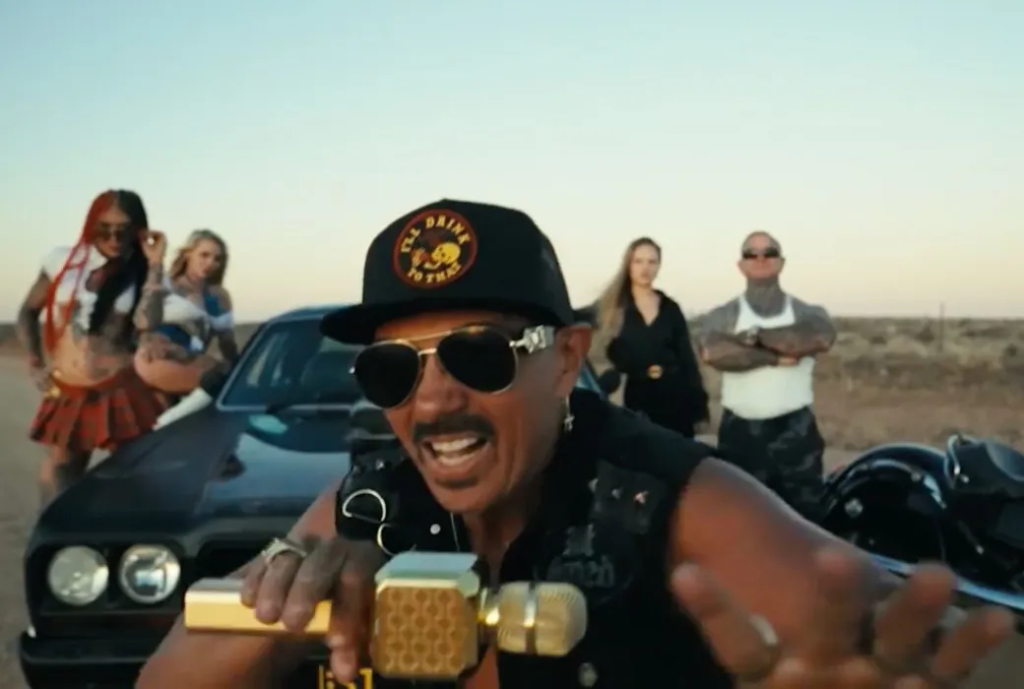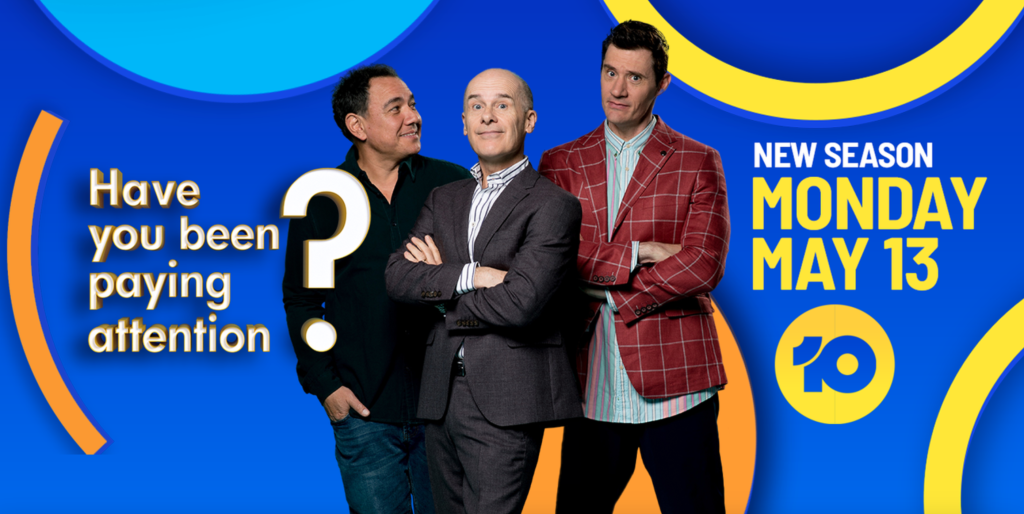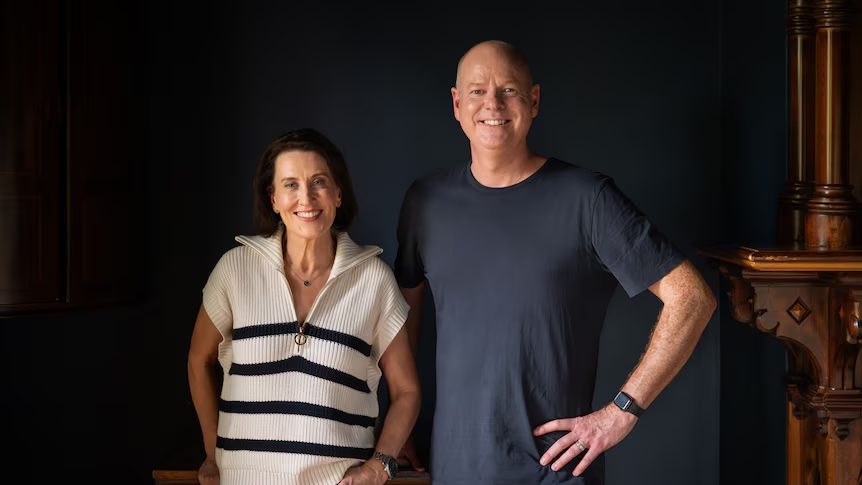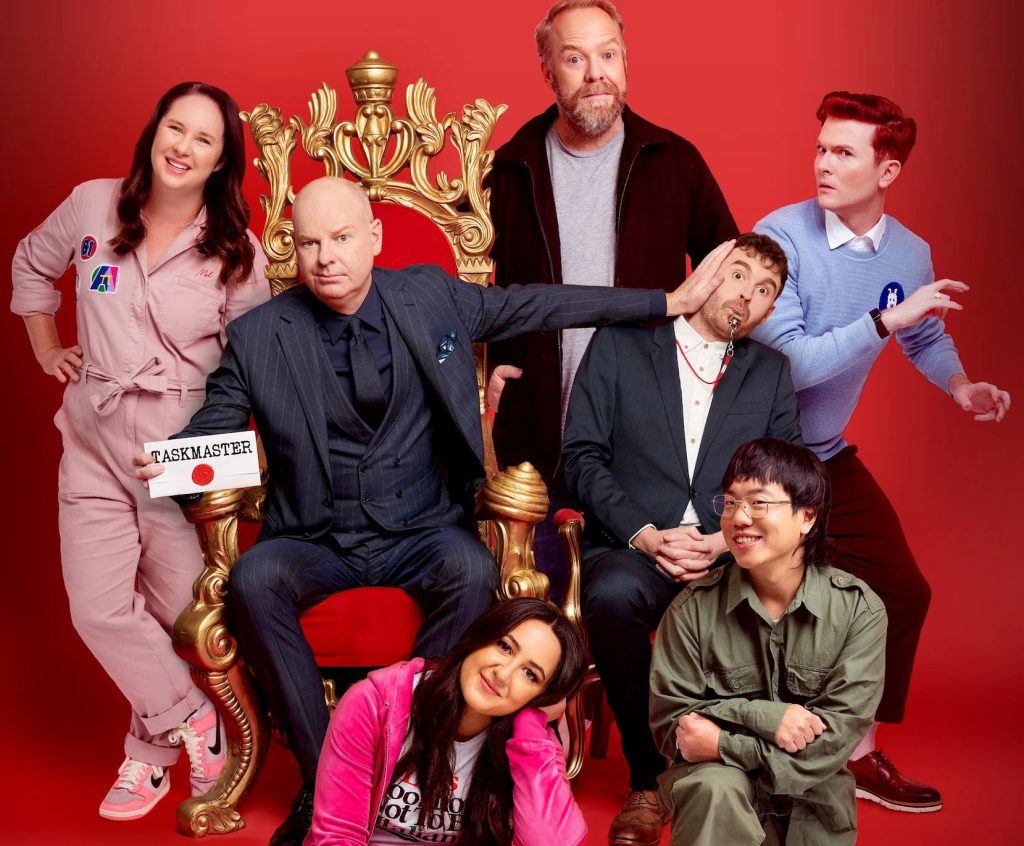Australian Tumbleweeds
The Outback Outlaw Pauly Fenech
Pauly Fenech is back (when is he not?) with a new series, Outback Outlaw Comedian (7Mate/7Plus), in which he tours the country with his live show. But in case you’re worried that this is going to be a bog-standard documentary about life on the road, don’t worry. There’s way more going on here. This is a show about one man fighting the scourge of political correctness and making comedy for real Australians.
“THE WOKE MOVEMENT HAS KILLED AUSSIE LARRIKIN COMEDY” the show declares upfront. “FORCED OUT OF CAPITAL CITIES ONLY ONE COMEDIAN REMAINS.”
And so, accompanied by bodyguard and former Mr Universe Lee Priest, dancers and Only Fans content creators Tayla and Sam, and tour manager Leah, Fenech drives from town to town, putting on shows in pubs and hanging out with the locals.
But if you’re curious about what’s in Fenech’s live show, too bad, you’ll have to pay to see it. The bits where he presumably does some kind of stand-up aren’t part of Outback Outlaw Comedian. All we get to see in this show are the bits where Tayla and Sam get their gear off and get “thonged”.
Thongs, and people getting hit with them, have long been a part of Fenech’s schtick. He even has a rainbow thong, for thonging members of the LGBTQIA+ community. So, once Tayla and Sam have been slapped on the arse with thongs multiple times – and who knows, maybe this is the funniest part of the show and not just some gratuitous violence and nudity – it’s the turn of the audience to get up on stage and cop one.
In case you’re wondering, men get thonged in the face while women have to bend over and bear their arse to take their thonging. Fenech explains that this is because he could never thong a woman in the face. Or hit a man on the arse. These are his standards.
Why people line up to get thonged by Fenech is unclear. Possibly there’s some set-up in his stand-up act which makes getting hit with a thong sound fun? Either way, lots of people do it. And not all of them are blind drunk.
Cut to after the show, where Fenech likes to wind down from whatever his act actually is by having a few drinks and partying with his outback mates. There’s metal music, people doing burnouts in their Valiants, and a turn from yet another “dancer”. But, hey, back off inner city, latte-sipping, politically correct types, this is the real Australia having fun their way!
Meanwhile, back on the road, there’s an attempt to make Outback Outlaw Comedian more of a documentary-drama, when the car in which Leah, Lee, Tayla and Sam are travelling gets a flat tyre. Leah, as tour manager, has to fix the problem, but it takes her ages, and they arrive late at the next venue. Oh no! What will they do?
Introducing some other characters or having some kind of plot or peril in this series would certainly make it more interesting than footage of Fenech hitting people with thongs and getting pissed. But plots and storylines have never been Fenech’s strong points. His key skill is getting shows on TV multiple times a year. And Outback Outlaw Comedian is presumably a way for Fenech to make some easy TV, and a bit more money, out of his live tour, by just…filming his live tour.
Except we don’t really get Fenech’s live tour; we don’t see his stand-up and there’s no real insight into what happens behind the scenes. We don’t even get much about how Fenech’s standing up to the woke brigade. We just get tits and thongs and arses. For 30 minutes including ads.
And after all that, the real arse is you for having watched it all.
Taskmaster, Cut Faster
Does a television comedy require comedians? Probably not; there’s been plenty of decent vox pop segments over the years that have scored big laughs without the use of skilled professionals. So does Taskmaster Australia require comedians? Now that’s a question.
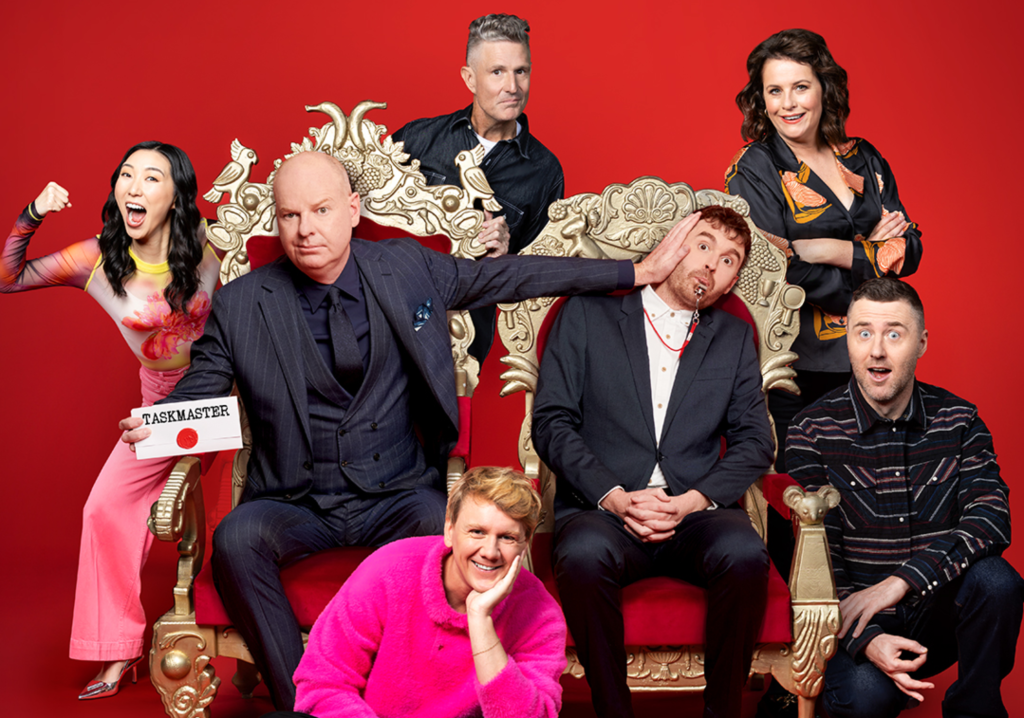
Back for a second season that’s technically a third because the second – which they filmed before the one currently airing – was lacking just a little in star power (don’t worry, it’ll air later this year), Taskmaster is pretty good at what it does. But does that require comedians?
On the surface, having them there probably doesn’t hurt. So they should sack Tom Gleeson right away. Haha, only kidding! We’d say about 60% of the reason Australia got its own version of this UK format is down to the already inexplicably popular Gleeson having a comedy persona that’s perfect for the hosting role.
So while we’re not fans of what he does, he’s generally doing a serviceable job of it here. Likewise, everyone else this season. Wil Anderson seems slightly bemused that he’s actually required to be funny. Josh Thomas is dusting off his old Talkin’ ’bout Your Generation persona of “slightly annoyed brat” only it’s at least a decade too late. Jenny Tian is just happy to be there. And married couple Lloyd Langford and Anne Edmonds are solid performers as per usual.
Which is to say, they’re all wasted on this show, because this show doesn’t need comedians at all.
Oh sure, it’s always good to have comedians on our screens. But do you know what’d be better? A show where they got to do what they thought was funny – after all, these are all professional comedians who have a pretty good idea of what they need to do to make people laugh – rather than a bunch of wacky stunts. Because let’s be honest: on Taskmaster, it’s the stunts doing all the hard work.
Taskmaster is the kind of show that appeals to famous but possibly not that off-the-cuff funny comedians, because all the work of being funny is done for them. Sure, they can (and often do) make the stunts even funnier. But a lot of the time, the funny stuff is really just the audience thinking “can’t wait to see what they’ll do with this!”. Any celebrity can generate that kind of connection with the viewer. Hell, most regular folk can generate that once they’ve had even the briefest opportunity to disply any kind of personality – as shown by pretty much every single game show on television over the last 60 years.
Usually it’s not quite as obvious that the comedians’ skills are going to waste, because the people doing the tasks are people like Peter Helliar or Julia Morris. But everyone this season is funny or Josh Thomas (who can be funny in the right setting). Does making them wear a helmet with a stuffed seagull on top make them funnier? Sure, for about ten seconds.
To the format’s credit, it avoids pretty much all the usual pitfalls. The tasks either produce wildly different results or lend themselves to very different approaches, so we’re not just watching the same thing happen five times. Constantly cutting back to everyone sitting around with Gleeson and sidekick Tom Cashman allows some panel show banter to mix things up. It’s varied, it’s fast paced, the stunts are well thought out and allow the contestants a bit of room to express themselves.
But those contestants don’t need to be comedians. And if your show would work with anyone, is it a comedy? Or just a version of MasterChef where the cooking challenge is getting hot chips out of a balloon?
Vale The Weekly, Hello Gruen
So messed up and lacking in cash is the ABC comedy department at the moment that we pretty much only get one comedy show on air at a time. Last week we had the final episode of The Weekly. This week, in the same timeslot, we have the first of a new series of Gruen.
Both The Weekly and Gruen are shows that no one seems to want or know how to kill. The Weekly just finished its 10th series, but will be back in December with The Yearly, and in 2025 for series 11. Gruen is on something like series 16, and boy does it look it. But let’s take a quick look at the final episode of The Weekly before we tackle the return of Gruen.
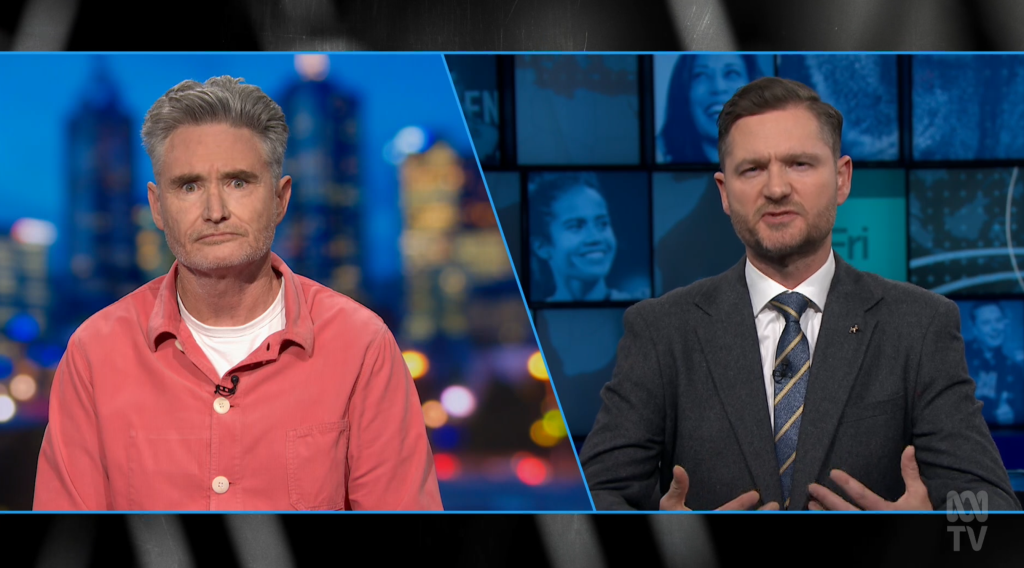
“We’ve saved the best ‘til last” announced host Charlie Pickering, in his opening remarks. And perhaps The Weekly had, by their own, low standards. But for us, this statement was kinda undercut by the preceding sketch, which was about Barnaby Joyce being filmed drunk and lying on a footpath. A story that broke THREE MONTHS AGO.
We’ve talked plenty about The Weekly taking weeks to get around to stories which are no longer topical by the time they talk about them, but we repeat, this happened THREE MONTHS AGO*. Sure, it’s an amazing story that no one can forget. But it would have been way more effective to air this sketch within a week of it breaking.
Which is the Weekly story in a nutshell. If you can’t be funny**, there’s still a load of obvious ways to punch up a satirical program. Be vicious, be topical, be intelligent, be stupid, be knowledgeable, be opinionated. Just be anything that isn’t bland. Oops, looks like they messed that one up too.
The Weekly‘s decision – if anything about that show is ever actually “decided upon” – to ditch pretty much everything in favour of interviews and panel chat presumably made it easier to make. Spending an entire season on one-joke ideas like Australia’s Next Top Ally definitely made it easier to skip.
But the real problem came yet again with the announcement that The Weekly will be back in 2025. Not because it’s a garbage show that’s a waste of even the minuscule resources that go into everything that isn’t Charlie Pickering’s salary. But because leaving this crap on auto-renew encourages the lazy, half-arsed effort we get every week when we mistakenly tune in.
The Weekly is a show made fresh each week. And yet, almost everything about it feels like they had one staff meeting at the start of the year, threw out a few ideas for ongoing segments, went “that’ll do” and made fourteen slightly different versions in an afternoon.
Week after week the same boring segments run the same unfunny jokes into the ground. Any possibility of being surprised, let alone amused, was pummeled out of the format years ago. Much like any sign of intelligence or engagement in Pickering’s eyes when he’s reading off the autocue. Which is all the time.
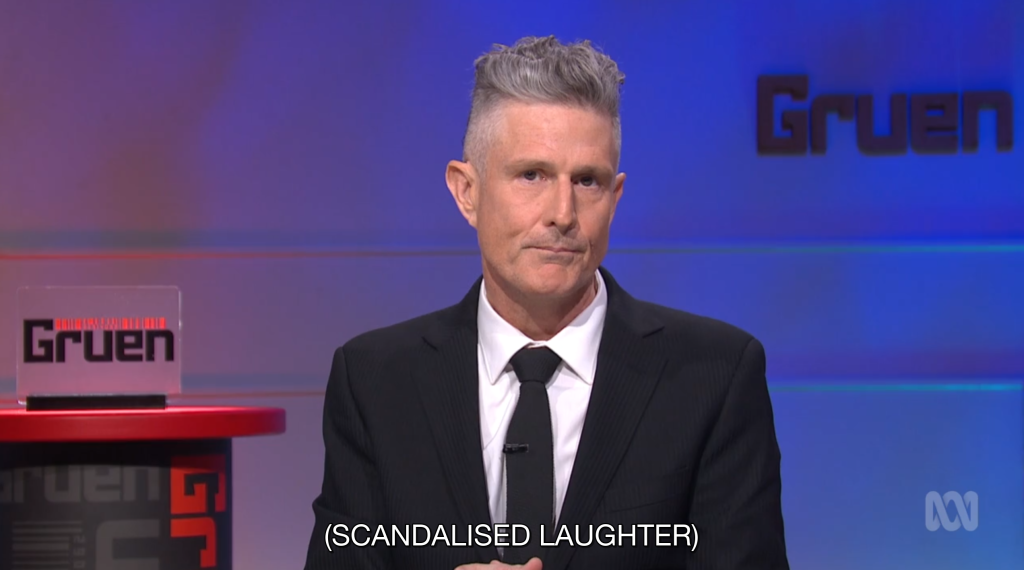
And then there’s Gruen, the cockroach of ABC infotainment. Remember that decade or so where the ABC’s approach to just about everything in arts and culture was to make a version of Gruen about it? And now the ABC has no arts programming at all. Really makes you think.
If television worked the way it’s supposed to, the creatives – we use that word advisedly – involved with Gruen would have walked away years ago. Fifteen years doing the same thing? And that “same thing” is talking about advertising? Way to advertise you’re utterly dead inside.
But to its credit, Gruen has lasted so long almost nobody remembers that it’s basically just one of those “World’s Wackiest Commercials” specials sliced really thinly and padded out with a team of corporate blowhards wheeling out the kind of talking points their staff ignores while they actually get work done. Advertising works, just so long as you keep doing it until everyone who disagrees is dead.
There was a point in the first episode back where one of the panellists said “In ten years time, when people say ‘what’s your favourite ad'” and we didn’t hear the rest because we were too busy kicking our television set in. Nobody real ever says “what’s your favourite ad”. Ads are shit. The only time anyone has an emotional connection to an ad is when the ad comes from another country and is selling something that isn’t available. So basically, a comedy sketch.
The act of being sold to – of having a relationship revealed to be a commercial transaction – destroys any chance of authentic emotional connection. We all know this, unless you’re one of those guys who falls in love with the sex worker that you’re paying for sex. That’s why appearing on an ad is a step down for comedians. It devalues their brand, to use an advertising term.
And yet Gruen, while discussing that Hubbl ad Hamish & Andy are on, never come out and say “this makes Hamish & Andy look bad”. Which is the big takeaway from every single celebrity-fronted campaign: a celebrity is cashing in on their fame to sell us crap.
This is why Gruen is trash. Well, not the only reason, as having a bunch of unlikable advertising executives spew marketing-speak about commercials on the ABC is offensive on a number of levels. But Gruen, like most products sold through advertising, doesn’t even live up to its marketing. It’s not a program that lifts the lid on the advertising world. It’s a program that lies about advertising to try and promote it.
And like every other commercial, it makes everyone who appears in it seem just that little bit more shit.
.
*anyone else get the feeling they made this sketch a while back but never found room to slot it in? Here’s a tip: maybe don’t make your emergency “we’ll put this on when there’s nothing else happening” sketch about something that’s extremely topical
**they can’t
Fresh Blood 2024: Finally, KingsLand gets released
Three months after all the other Fresh Blood pilots were released, KingsLand is finally here. Has it been worth the wait?
KingsLand, created by Joshua Yasserie and written by Jon Rex Williams and Yasserie, focuses on Reg (also Yasserie), an older First Nations man living in a run-down house in Redfern. But Reg isn’t just First Nations, he’s animated, which means he has an extra tough time just living his life.
As a result of Reg simply walking down the street, a jogger (Jon Rex Williams) calls the cops. “Hey, you never seen an animation before?” asks Reg, “I was here before you lot!”
Later, at a local coffee shop, Reg can’t buy a drink as they’re cashless and he’s only got coins. “Sorry,” says the barista (Vic Zerbst). “You say sorry a lot, but no one ever helps” replies Reg.
Reg continues on, encountering an earnest, white hippy couple (Will Gibb and Jenna Owen) trying to busk with some digeridoos. Reg tells the female hippy she can’t play the digeridoo, but the pair berate him for sexism. She then white-splains that many First Nations mobs were matriarchies, which she thinks is “really cool.”
Then, Reg tries the pub, where the Pacific Islander bouncer (Jay Laga’aia) points to a sign reading NO ANIMATIONS and tells him the pub’s full. So, it’s back home to find Reg’s been evicted, and his house has been sold to a real estate agent (Lewis Hobba) who reckons he can get $1.8 million for it.
All of this takes place in the first episode, with an all-Aussie ballad overlaying the footage. As lyrics about how Australia’s the “lucky country”, and “everyone calls you mate”, and “it’s a country we can all share” are heard, we see how hard life is for Reg. None of this subtle satire, but does it need to be?
In the second and third episodes, there’s a change of direction in tone, and hope for Reg as a vision of his late wife (Ursula Yovich) inspires him to leave the city to find his country. It’s not easy, as Reg doesn’t know how to survive in the bush, but then up pops Wiiny the koala (voiced by Krystal May), a fellow animation, who steers him on the right path.
It’s hard to know for certain where the writers want to take KingsLand next, but it feels like, after the hard satire of the first episode, the plan is to continue the story with a lighter style of comedy. That’s a good direction to take and suits the premise of this being Reg’s quest for country. The show will need a few characters if it’s to thrive in a longer format, though.
Read our reviews of all 2024’s other Fresh Blood pilots.
Creative Types with Tom Gleeson
In Virginia Trioli’s new-ish series Creative Types, she “explores the essence of creativity with some of Australia’s greatest artistic minds.” And Tom Gleeson.
Was that a cheap shot? Yeah, but Gleeson is kinda the master of the cheap shot. So we think it’s appropriate.
Gleeson is sold to us as a hard-working stand-up who’s forever listening to recordings of his routines and trying to improve them. Apparently, he spends hours cycling around the country town where he lives doing this. We admire his work ethic and his commitment to creating quality comedy. But the problem is, Gleeson’s comedy is not always quality.
Let’s compare two recent-ish Gleeson routines which get a fair bit of attention in Creative Types. The first is some observational material about KeepCups which is fairly average but nevertheless seems to go down well with the audience. Yeah, okay, KeepCups are a bit of a wank. People think they’re saving the planet by bringing their own cup, but they’re not really, are they? We’ll give Gleeson that one.
More contentious is Gleeson’s material on owning a “spare house”. This routine, Gleeson justifies as being “one of the things you’re not supposed to talk about”. And it’s the “things you’re not supposed to talk about” that Gleeson believes are the best areas for comedy.
This is often true of comedy, of course. Saying the unsayable, pricking pretensions, shining a light on hypocrisy, these are all things that comedy can do brilliantly. But – and this is pretty important – only if the audience agrees with you.
Listen to the audience’s muted reaction to Gleeson talking about his spare house. And his justifications for owning it. Yes, he acknowledges, there is a housing crisis, but that’s up to others to fix. There’s a small amount of uncomfortable laughter at this. Undeterred, he doubles down. Unsuccessful people live in share houses, he says. He’s successful, which means he’s got a spare house. The audience, presumably thinking of how much they’re paying in rent, the sky-high cost of their mortgage, or how impossible it is to save for a deposit, are less convinced. Clearly, they preferred laughing at those idiots with their KeepCups. They can afford a KeepCup.
We then hear a bit about Gleeson’s origins. He says he felt like an outsider at his tiny country primary school, and later at the boarding school he attended. At Sydney University, he had a chance to perform and won a comedy competition because he worked hard, doing spots at local clubs to hone his routine. Later we see footage of some of his early routines in the late 90s and early 00s, on Recovery and at the Melbourne International Comedy Festival. Peter Hellier and Melbourne International Comedy Festival Director Susan Provan pop up to say how hard-working and talented Gleeson is.
We see footage from Skithouse, of Gleeson’s character the Australian Fast Bowler, which Gleeson described as coming from the idea that most sketch show characters are losers and what if a character was a winner. Nice theory, but in the sketch shown the only funny bit is when the Bowler, who’s asked to rescue a cat from a tree, knocks the cat out of the tree with his ball. It’s the comic violence that people are laughing at, not the idea that the Bowler is a winner, making a failure of Gleeson’s theory of comedy.
Speaking of failure, it’s over to The Weekly where we hear about the origins of the Hard Chat segment and Hard Quiz. And, yeah, in these Gleeson does deliver some funny lines from a position of power. But aren’t the funniest bits of Hard Chat and Hard Quiz when the guests/contestants are funnier than him? Gleeson’s punching-down comedy may be why he thinks he’s successful, but his punching-down material isn’t his most successful comedy.
His work getting Grant Denyer and then himself the Gold Logie also gets featured. We discover that Gleeson’s a huge Norman Gunston fan and was inspired by Gunston’s 70s campaign to win the Gold. There are some differences between Gunston’s campaign and Gleeson’s though. Gunston’s campaign was in the context of the central joke of the Gunston character and the Gunston show, that Gunston was a shonky interviewer on a shonky show, on a network that no one watched. So, whether he won or not, there were laughs to be had about the improbability of it all.
Gleeson’s campaign also tried to have it both ways but in (a) different (two) way(s). At the time, Gleeson argued both that the Logies was so shonky that even he could win one, and that his winning the Gold Logie meant he was brilliant. Whereas in the case of Gunston, the joke was more that there was no way that Gunston, who was shonky, could win. It was about the Gunston character being a chancer, rather than a real-life Gleeson actually thinking his win justified everything he’d ever done.
And, yeah, Amanda Keller’s death stare was funny during Gleeson’s victory speech (she was one of the nominees he beat). But maybe she had a point? Tom Gleeson just won something, which he’ll dine out forever more on. Is that actually what we want?
Towards the end of Creative Types, Gleeson describes his act as both trying to make the audience laugh and annoy them. And, yeah, a comedian annoying their audience can sometimes be very effective, in terms of getting them to see other points of view or getting up the noses of people whose noses a comedian should be getting up. But Gleeson isn’t always annoying people for these reasons. A lot of the time, he’s lording it over them. Like he is with his second house.
Is Gleeson then, not only a diligent and hard-working comedian but also on some kind of power trip? A power trip he makes more palatable by doing some audience-friendly routines about minor things that annoy people. And yes, he’s successful, and he makes a good living, but does he deserve it?
Taskmaster is back
It’s press release time! Via TV Tonight:
Taskmaster Australia is returning to 10 later this month, but in a surprise twist, the network will screen its third batch of comedians now as a second season.
Last July, 10 announced Peter Helliar, Mel Buttle, Aaron Chen, Concetta Caristo and Rhys Nicholson for a second season. In March TV Tonight revealed Anne Edmonds, Jenny Tian, Josh Thomas, Lloyd Langford and Wil Anderson were also filming next episodes -these will now form a second season to screen later this month.
TV Tonight understands the switcheroo is due to talent availability for promotion, with the remaining season to screen later this year.
Returning to their hosting thrones for season two, is tough-love Taskmaster Tom Gleeson, and his loyal sidekick “lesser Tom” a.k.a. Tom Cashman, both ready to test the wiles, wit and wisdom of our five new comedians.
Stepping up to the Taskmaster challenge and competing for the golden version of Tom Gleeson’s delectable noggin, is comedy royalty Anne Edmonds, Jenny Tian, Josh Thomas, Lloyd Langford and Wil Anderson.
Each week viewers will witness these best and brightest comics go head-to-head in a string of ridiculous, rambunctious and bewildering tasks to bag the highest points, all for our amusement.
From building scarecrows, to catching hot chips and fielding a lesson with lemons, will they have the prowess to win over our supreme Taskmaster?
Taskmaster Australia is produced for Network 10 by Avalon / Kevin & Co.
Thursday, 23 May at 7.30pm on 10.
More comedy on TV is good, but is Taskmaster comedy? Or just some comedians doing stupid tasks? And are stupid tasks, even if done by comedians, actually funny? Or is “doing stupid tasks” a concept better suited to YouTube or TikTok?
Also: two series of this in one year? Really? When there are actual comedy ideas out there being pitched all the time?
Both the Taskmaster concept and that we’re getting two series of it in one year, say a lot about where TV comedy is today. Networks are too scared or too poor to do the kind of comedy that TV’s great at (sketch, sitcoms, tonight shows, satire), so they’re scrabbling around for cheap, YouTube-esque concepts that aren’t particularly funny but, hey, there’s probably an audience somewhere. What a time to be alive!
We’ll Sell You the Whole Seat But You’ll Only Use the Funny Bit
The Cheap Seats is back for 2024, and if you were ever looking for a textbook example of “if it ain’t broke, don’t fix it”, it’s your lucky day. And has been since 2021, if we’re being honest.

As this is currently one of our favourite Australian comedy shows, we’d love to have a lot to say about it. But as it’s also a well-oiled comedy machine where those involved know exactly what they’re doing, we’re coming up short.
One thing that did stick out about the first episode back? Just how much time and effort goes into a show that looks so, uh, cheap. Not only were there a huge amount of news clips being churned through at a rapid rate, a hefty slice of them were from overseas outlets. Sure, after four years they know where to look. But even so, once you start looking globally for clips of newsreaders impersonating seagulls, your job gets a whole lot bigger.
Hosts Tim McDonald and Melanie Bracewell remain great: no notes. The duo continue to be slightly dorky while also being extremely quick when it comes to cheap gags. If the clips are 60% of the show’s success, they’re another 60% on top of that.
The days Bracewell has a firmly developed comedy persona that extends into the real world (ever noticed how often there’s a clip or news story involving her doing something outside the show?). She’s a successful stand up, she likes and plays netball, there’s that whole New Zealand thing. McDonald is more of a man of mystery, in that he probably isn’t a dateless loser with a drunk mum.
Obviously with an entire new season ahead, the first episode is probably only a rough guide to what’s to come in 2024. No sponsors yet! Zero sketches in the first week! No time for What’s On What’s On in the Warehouse! Will What’s Flappening be back and will they ever do an story on an actual bird?
Not that there aren’t one or two real questions to be asked. Having Adam Rozenbachs hosting the sport segment might mean he’s the new regular sports hosting person. Or it might just be that he was handy this week.
Would it be be good if they could find a regular sports host? Yeah, probably. But as none of the Titus O’Reily replacements have been as good as Titus O’Reily (let alone up there with breakout star Mel Tracina covering “the arts”)… maybe the door remains open* for a dark horse candidate?
Eh, whatever. The clips are funny, the hosts are funny, the jokes are funny: Cheap Seats, as always it’s good to have you back.
.
*Unfortunately The Front Bar seems to have hoovered up all the top-tier sports comedy talent
There’s no Colin from Accounts-ing for taste
It’s press release time! Or, more accurately, here’s something we saw on TV Tonight:
Season Two of Colin From Accounts, written by and starring Patrick Brammall and Harriet Dyer, will be premiere on Binge / Showcase in May.
Returning cast members are Emma Harvie, Genevieve Hegney, Michael Logo, Helen Thomson, Darren Gilshenan, Annie Maynard and Tai Hara.
Joining for season two is Celeste Barber (Wellmania, The Letdown) as Katie, Virginia Gay (Savage River, Safe Home) as Rumi, Justin Rosniak (The Surfer, Mr Inbetween) as Alistair, Lynne Porteous (Home and Away, The Commons) as Dawn and John Howard (SeaChange, The Merger) as Brian.
Virginia Gay said: “It’s very rare that you get to walk onto the set of your favourite show and become a part of it. I love this show with all my heart, and the reason that it’s so brilliant is because of the Patty-and-Harrietness of it. They are a joy to be around, and that joy is all over the screen.”
John Howard said: “I am so excited to be joining the cast of Colin from Accounts. The series has made so many people around the world laugh and it is a hilarious take on bouncing through love and life, warts and all. Well, no warts as far as I know of…”
Justin Rosniak said, “Colin From Accounts is the best show in Australia, hands down. If you’re not laughing your head off, you’re bawling your eyes out. It is truly an honour to be a part of this magical experience.”
In season two Ash and Gordon are now living together and trying to get their beloved, special needs dog, Colin, back from his new owners. It’s the first in a series of hurdles for the new couple, as they find out more about each other, for better and worse.
Colin From Accounts is produced by Easy Tiger Productions (Jack Irish, Rake, The Twelve) and CBS Studios with Rob Gibson, Ian Collie, Patrick Brammall, Harriet Dyer, Trent O’Donnell, Alison Hurbert-Burns and Lana Greenhalgh serving as executive producers and Kevin Greene producing. O’Donnell returns as set-up director, with Robyn Butler and Wayne Hope taking the reins for three episodes and Madeleine Dyer returning to direct an episode.
Thursday May 30 on Binge / 8.30pm on Showcase.
The return of any Australian series should be a moment of joy, especially in these lean comedy times, but it’s hard to get excited about this one. Two years ago, when the first series was announced we said:
We’re predicting mildly eccentric characters, low-stakes peril, and minimal belly-laughs.
This isn’t the kind of show that’s designed to be funny. It’s the kind of show that’s designed to be sold to international streaming services looking for inoffensive dramedies in mildly exotic locales.
And, yeah, we were right. Oh, look! The BBC bought the second series sight unseen after the first series became popular in the UK.
Remember when Colin from Accounts won Best New Comedy in the 2022 Australian Tumbleweeds Awards and the best any of the people who voted for it could say was:
This was a mediocre year.
But why is this series, which tries to be funny and charming and relatable, but is actually a bit of a dog’s breakfast, so successful? We think the show’s secret is that key factor in any comedy’s success: timing. Although sadly not the sort of timing which makes jokes work.
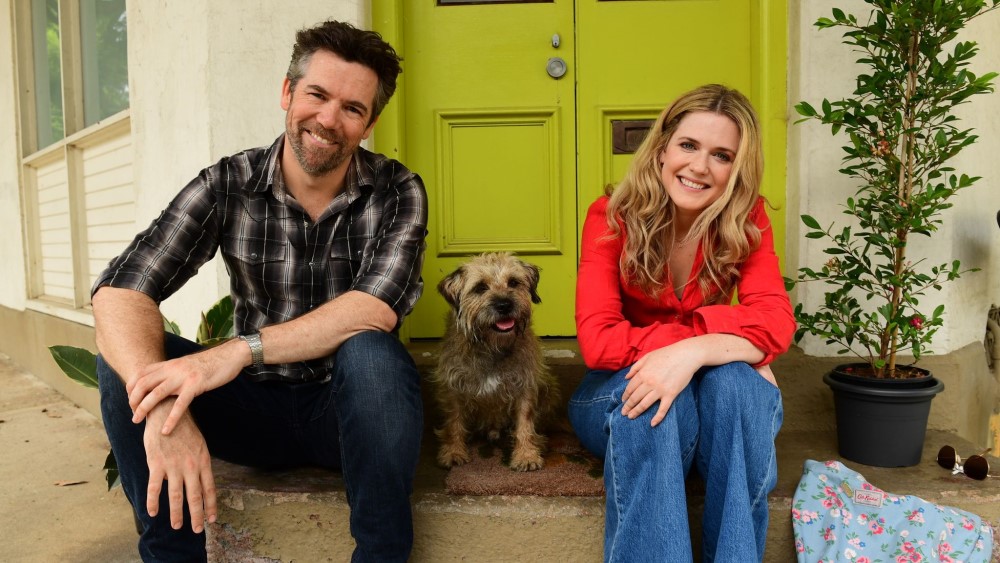
Colin from Accounts landed as the Covid-19 pandemic was coming to an end. Lots of people were signed up to multiple streaming services and were looking for something light-hearted and uncomplicated to watch. Colin from Accounts fit the bill at a time when there were fewer options than usual.
So, while this is a show which can boast international sales and multiple award wins and nominations, its real secret is it was there at the right time to meet a need. But several years on, with a cost of living crisis and multiple wars raging around the world, will Colin from Accounts still be the kind of show people want to see?
White Lines
Where do you draw the line with White Fever? As previously discussed, it’s perfectly fine for what it is: it’s just that what it is isn’t a comedy. Which is a problem, because if a half hour scripted series airing on the ABC at 9pm on a Wednesday isn’t a comedy, what is?
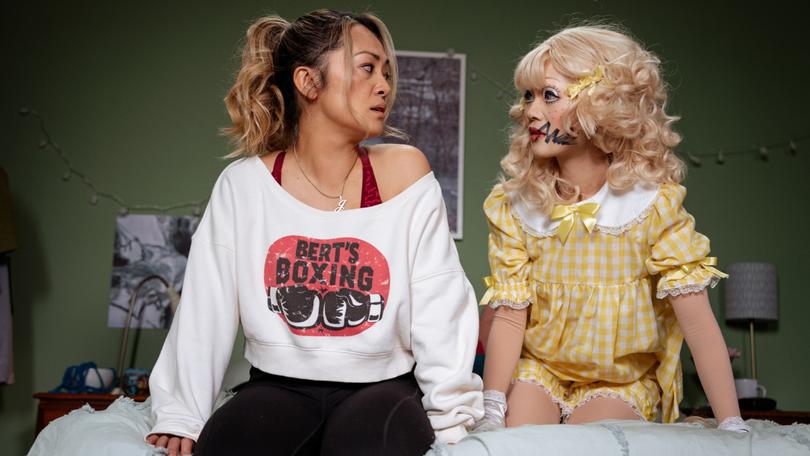
As you’ve possibly heard, Gruen is due back on our screens May 15. Well, not our screens; fucked if we’ll be putting ourselves through that for a 16th season. But it’s a timely reminder that the ABC “comedy” timeslot – roughly one hour on a Wednesday if you don’t count Hard Quiz and who does – increasingly doesn’t bother with comedy.
For example, White Fever. It’s a prime example of one of the many genres the ABC likes more than comedy: an issues-based series aimed at young* people. As we all know, pretty much every show aimed at young people on Australian television is going to be promoted as a comedy whether it’s funny or not. What have young people got to be worried about? Nothing: therefore comedy.
It’s also about young people’s relationships. That usually sets off alarm bells when the ABC is involved because they seem to only take on stories that feature young characters whose primary relationship is with being annoying. Over and over again they serve up series where the main idea seems to be “what if we reinvented the concept of screeching harridans for the 21st century?”. Clearly the only way any character under 40 could be funny is if they were some hideous caricature even Chris Lilley would think twice about playing.
Remember All My Friends Are Racist? Of course not. How about Why Are You Like This? Not that we’re saying they’re the same show, but the ABC does have a type when it comes to young people’s programming. And if you manage to get your eyes to unfocus like you’re looking at a magic eye poster, White Fever kinda sorts fits the formula.
Fortunately, White Fever is better than your average ABC young person’s relationship comedy. That’s not difficult: it’s a grim lineage that stretches back at least as far as Laid. Unfortunately, the way it manages to be a better program is by not even trying to be funny for long stretches.
Again, it’s good at not being funny, in large part because it’s actually about something beyond the lead’s romantic entanglements. Remember Please Like Me? The hilarious sitcom that ended every season with a main character’s death (or coma) bumming everyone out? Was that ever about anything beyond Josh Thomas making out with various handsome actors?
To take a wider view, it’s been extremely obvious for the last few decades that, thanks to Australia’s model of television funding – where your real audience is funding bodies – actually making a completed television series comes a distant second in importance behind the funding body crafting a press release announcing that they’ve given your brilliant concept some cash.
White Fever works because creator and star Ra Chapman had a story she wanted to tell. More often, we just get a concept that sounds good to the funding bodies. When it comes to the finished product, the execution falls over.
And when you’re making a comedy, execution is everything.
.
*for “young”, read “under 50” – after all, this is the ABC we’re talking about

